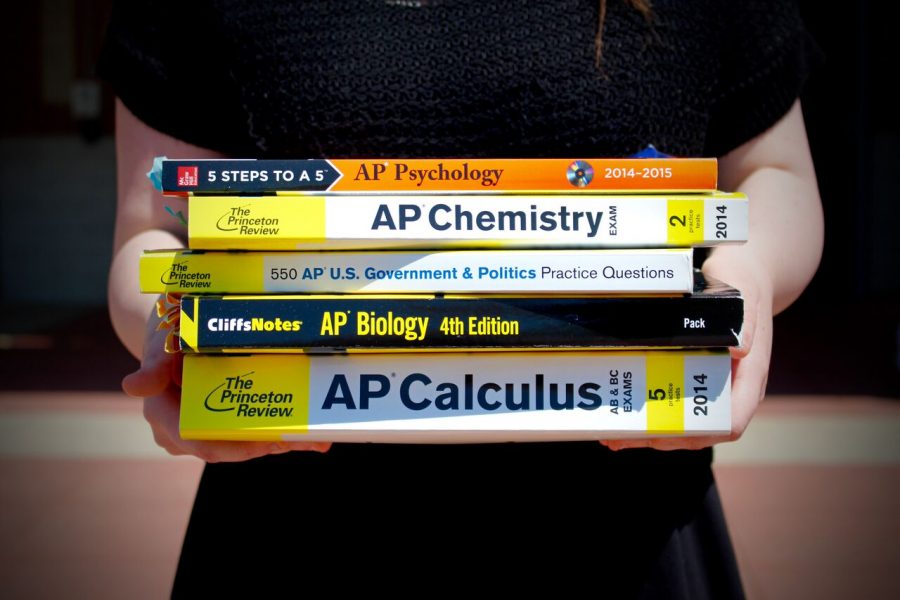Studying is personal; don’t make review packets mandatory
Students carry stacks of AP review books to prepare for AP tests, but many teachers still require students to complete thick review guides. Photo by Olivia Matthews.
May 21, 2017
It’s a common sight during AP exam weeks at Whitman: students stumbling through the hallways, struggling to balance a tall stack of AP review books. This year, I joined the AP madness too, toting my review book from class to class. I had to make a choice—either spend my time studying with my own methods and review book or complete a 27-page review packet for a 100 point grade in my AP U.S. History class.
Mandating that students complete review materials in preparation for AP exams isn’t an uncommon practice at Whitman; AP classes that assign students mandatory review materials include Comparative Politics, U.S. History, Human Geography and Physics 1.
This year, AP U.S. History teachers required students to complete a lengthy review packet, which consisted of making 120 flashcards, matching 91 historical events with their date, matching around 450 terms with their definitions and identifying and explaining 20 mystery documents. These rote exercises felt like busywork, not something that would prepare me for an AP exam with an emphasis on analysis.
Knowing that this seemingly endless packet would make my study calendar essentially obsolete, I was among 64 percent of Whitman AP U.S. History students who completed the majority of the review packet the weekend after the AP exam and the 50 percent of students who didn’t find the review packet useful, according to a Black & White survey.
But this doesn’t mean I didn’t study for the exam—I read my 350-page review book two times through, made my own terms list and took two practice tests.
I chose to study on my own rather than spend my time on the review packet because I recognized that studying is a personal task. The methods I used worked for me when I studied for the AP U.S. Government exam last year, and I was confident they would prepare me once again.
Every student has their own learning style, and they shouldn’t be forced to conform to a fixed study method. A review packet can act as a valuable optional resource to be used for reference, but mandating that students complete all portions of a review packet for a grade is counterproductive.
Teachers who give out these review materials have good intentions; they hope to provide an effective study tool. But forcing students to spend hours of their limited studying time on packets that may not even help them instead of using their own methods defeats the packets’ purpose: preparing students for an AP test. Students who choose not to spend their exam prep time on the review packets end up putting off completing the mandatory materials until their due date—the day after the AP exam—at which point completing such an intense review is useless.
Many teachers are concerned that if they don’t give out mandatory review materials, students won’t be motivated to study for their exams. But 80 percent of AP U.S. History students surveyed said that regardless of whether their teacher had assigned a mandatory review packet, they would’ve studied for their AP exam. And based on the number of students I saw carrying review books during AP weeks, I think it’s safe to assume that this statistic describes students across Whitman’s AP courses.
The majority of Whitman students are responsible, hardworking and conscientious. It’s time teachers recognized this and trusted students to study their own way.








Dalton Yu • May 24, 2017 at 2:12 pm
I totally agree with you. I am also in APUSH and I found that review packet not very helpful. Sure, kind of helpful for the SAT 2, but not for the AP.
Name Required • May 22, 2017 at 5:27 pm
Why should teachers not teach students how to study? This makes sense for college but maybe not for high school. Teachers can’t require students to go out and buy AP review materials, so they’d have to put together free materials for students who can’t afford AP review materials on their own. But at that point, teachers are doing a lot of work developing review materials. Why not integrate those into the curriculum?